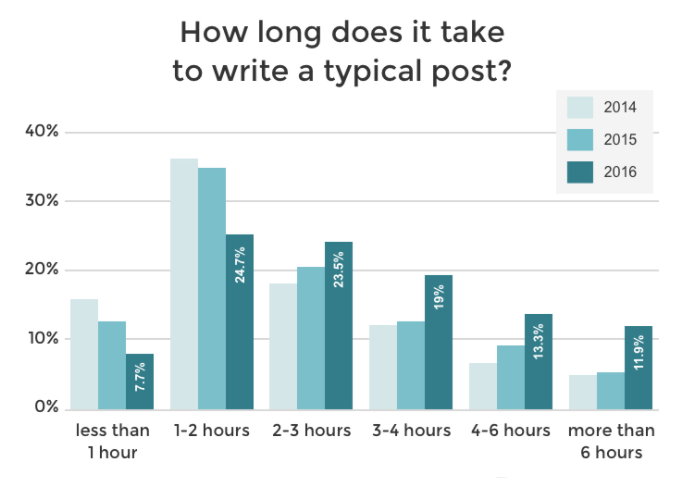Ok, I’m guilty as charged. One day I looked up and I hadn’t published a post in a month. The cardinal sin of bloggers is failing to publish consistently, and I’d gone and done it. Well, I’m back on track and here to tell you why it happened, and how you can avoid similar pitfalls.
The toughest part about writing or producing content in general is making a time commitment. There’s simply no way around it.
It takes time to produce these posts, and many businesses, when confronted by the harsh realities of time commitment, duck for cover.
As Orbit Media noted in their annual Blogger Survey:
The average blog post takes 3 hours 16 minutes to write. That’s a 26% increase from 2016.
That’s just the writing part of a blog post. But what about routing it through the company for approval, downloading photos and uploading them into your post, actually posting it, plus scheduling social media to promote it…all of that takes time.
That’s why it’s important that you commit upfront to finding the time to make blogging happen consistently.
The Importance of Being a Consistent Content Producer
Why should you stay consistent? Consider this excerpt from a post by Meghan Sullivan @meghandsullivan at Kuno Creative:
After a few months of frequent and consistent content publishing and promotion, a Kuno client celebrated its strongest month ever in terms of lead capture. Marketing KPIs were up dramatically by the end of the first quarter. This smashing success was followed by common internal roadblocks that caused a decline in the rate of content publishing and promotion. Leads were cut in half from the previous month. That’s how quickly the impact was seen. Four weeks.
Consistency also produces a key attribute of what Google considers “Quality Content:” fresh, unique content. This is from the Google Webmaster’s SEO Starter Guide @google:
There are a couple more reasons to blog consistently; one is common sense, the other is validated by compelling stats:
People love reading the Sunday newspaper, because they know it comes every Sunday.
We are creatures of habit. Play on people’s habitual nature, and give them content consistently.
Websites with blogs have 434% more indexed pages on average, and content-rich sites generate 97% more links.
That’s a stat from Quicksprout @neilpatel. The only way you’re going to join that group is to consistently produce content.
Roadblocks That Derail Producing Content Consistently
Ok, so I fell off the wagon myself. Here are a couple reasons why:
I was too busy with our current clients.
If you’re too busy with your current workload, then you need help. Offload some of the tasks that don’t require your personal involvement — scheduling tweets, creating graphics, etc.
The best time to look for new business — and that means content marketing — is when you’re busy, not when you’re desperate.
I didn’t stick to my routine.
I got side-tracked on a couple of big projects – important ones, but not mission critical – and they knocked me off my publishing routine.
I got complacent.
Winbound has a nice group of clients that treat us well, and we work exceptionally hard for them. However, you never know what tomorrow will bring. You could lose a client unexpectedly, no matter how loyal they are to you. That’s why you always need to stick to lead generation via content marketing.
I didn’t schedule correctly.
Similar to part one – I didn’t block off enough time to write. I could have, and should have, pushed some meetings back to keep my writing time sacred.
Final Thought: Slow and Steady Wins in Content Creation
One reason Stephen King is so prolific is his book-writing strategy of writing 1,000 words a day, every day. After 6-8 months, he has a book.
I’ve followed his strategy, and it works (although my books aren’t selling quiiiiiiite as well). The same thing holds true for blogging.
To produce a successful blog, you actually need to write consistently, otherwise the thing will never get done. No, we’re not trying to write a book – but we are trying to write a reliable source of content.
And that requires a consistent approach from the writer as well.
Find out how your content and conversion ranks with our interactive version of the Content Scorecard you can fill in yourself – no email required for download.




